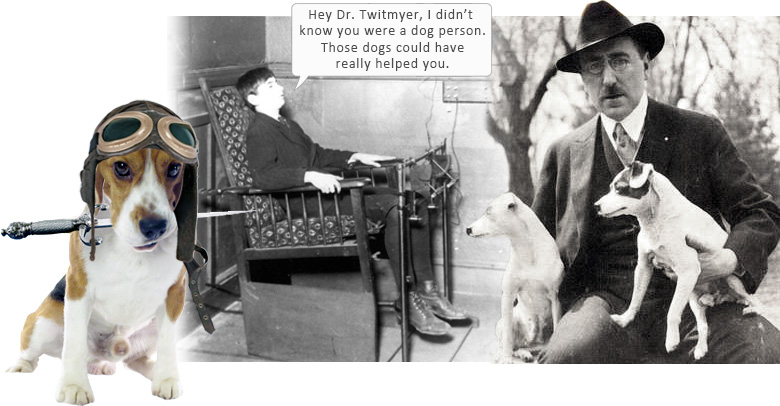Edwin Twitmyer failed to close a loophole and it cost him the Nobel Prize.
Twitmyer was working on his doctorate in Psychology at the University of Pennsylvania. His dissertation was on The Effect of Emotions on the Patellar Reflex, or Knee Jerk.
To make his research possible, Twitmyer built an elevated chair with a remote-controlled rubber hammer that would strike the person’s patellar tendon and trigger the predictable leg-kick. He didn’t tell his subjects when he was going to release the hammer, he simply let it fall and then measured how far the leg kicked. When his subjects complained that the hammer caught them by surprise, Twitmyer began sounding a bell just before he activated the hammer.
One day he accidentally sounded the bell without dropping the hammer and the subject’s leg kicked, even though the tendon had not been stimulated.
Twitmyer knew he had stumbled onto something important. He then began doing the same to his other subjects and found that they, too, would kick their legs forward upon the sound of the bell, even when they were trying not to. He published his findings in his doctoral dissertation in 1902, one year before Ivan Pavlov announced the results of his dog research at the 1903 International Medical Congress in Madrid.
But when Twitmyer presented his work at a meeting of the American Psychological Association, his research drew little response from the crowd.
Ivan Pavlov was awarded the Nobel Prize in 1904, not Edwin Twitmyer.
Twitmeyer knew he had a loophole in his research, but he failed to close it. As a good scientist, he acknowledged in his paper that the leg-kicks of the subjects could – theoretically – have been caused by his subjects voluntarily moving their legs, even though he was certain this was not the case.
That same possibility had occurred to the other scientists as well.
Here’s my point: When it comes to the purchases your customers make, each of them is occasionally a scientist. So when you speak to the customer’s intellect, you have to close all the loopholes. If you don’t, their doubts will remain and someone else, someone like Ivan Pavlov, is likely to make the sale.
But when you speak to the emotions you are speaking to that part of the mind that is more interested in feelings rather than facts. Win the heart and the mind will follow. The intellect will always create logic to justify what the heart has already decided.
When my partner Johnny Molson heard about Twitmyer and Pavlov, he said,
“So the moral of the story is that if a fella named Twitmyer wrote about conditioned responses a year before Ivan Pavlov did, that means you and I have been conditioned to associate Pavlov with conditioned responses, which would make it literally a Pavlovian-Pavlovian response.”
Here’s my second point: The discoverer of a new thing – the genesis agent – is rarely the one who gets the reward. The fame, the money, and all the credit goes to the popularizer who knows how to get people’s attention.
You don’t need to be the first.
You just need to be the one people see.
Roy H. Williams
 When we are young, we ask, “What do I want to be?” But for those who are wise, a much more important question comes later; “Who do I want to be?” David Shapiro is a philosopher and an educator who divides life into two parts: the young half and the old half. Shapiro says we should learn to grow “whole,” not old. “Everyone is getting older,” he says, “but not everyone is growing older.” Want to know more? The explanation will begin the moment you arrive at MondayMorningRadio.com
When we are young, we ask, “What do I want to be?” But for those who are wise, a much more important question comes later; “Who do I want to be?” David Shapiro is a philosopher and an educator who divides life into two parts: the young half and the old half. Shapiro says we should learn to grow “whole,” not old. “Everyone is getting older,” he says, “but not everyone is growing older.” Want to know more? The explanation will begin the moment you arrive at MondayMorningRadio.com
